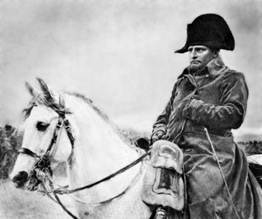 After careful study, scientists revealed that the French Emperor, Napoleon Bonaparte, died from an advanced case of gastric cancer and not arsenic poisoning as had been widely speculated. At the time of his death, an autopsy determined that stomach cancer was the cause of his death. But because arsenic was found in his hair in 1961, this led to speculation that Napolean had been poisoned. Certainly, murder was possible because, if Napoleon had escaped exile on St. Helena, an island in the South Atlantic Ocean, he could have changed the balance of power in Europe.
After careful study, scientists revealed that the French Emperor, Napoleon Bonaparte, died from an advanced case of gastric cancer and not arsenic poisoning as had been widely speculated. At the time of his death, an autopsy determined that stomach cancer was the cause of his death. But because arsenic was found in his hair in 1961, this led to speculation that Napolean had been poisoned. Certainly, murder was possible because, if Napoleon had escaped exile on St. Helena, an island in the South Atlantic Ocean, he could have changed the balance of power in Europe.
Bonaparte, the researchers said, had a very severe case of the cancer which had spread to other organs.
"Even if treated today, he'd have been dead within a year," Genta said.
Although the emperor's father also died from stomach cancer, Bonaparte's cancer most likely stemmed from an ulcer-causing bacterial infection, the researchers said.
A diet full of salt-preserved foods but sparse in fruits and vegetables--common fare for long military campaigns--increased Napoleon's risk for gastric cancer, Genta said.
The study was published in the January edition of the peer-reviewed journal, Nature Clinical Practice Gastroenterology & Hepatology.
Cited story.
.

Ah, so the wallpaper was innocent after all!
Bob
You can almost anagram "Neocon" out of "Napoleon."
Hedwig, do you know if these are the same folks that determined Edgar Allen Poe most likely died of rabies? I'd read an article about them, and how they take a "case" every year and examine it. It's interesting. Part of Poe's mystique is how he allegedly died of an opium OD, or alcoholism. Gave him a bit of that Jim Morrison/Kurt Cobain self-destructive genius thing. To know that he probably just got bit by a rat changes how we view him. I wonder if this finding will do the same for Napoleon...but to my shame, I don't really know how people view him.
A piece of trivia about Poe: he was an undergrad at the University of Virginia when Thomas Jefferson died. Poe was among the attendees at the funeral. Many top-level people missed the funeral because of slow travel and the need to get the dear departed into the ground expeditiously. George Washington so feared being accidentally buried alive that he directed he must be dead three days before being interred.